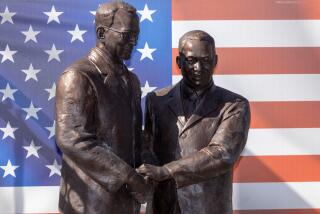Riordan Led, but Hahn May Have a Real Chance to Inspire
- Share via
What is Los Angeles to make of Richard Riordan’s mayoralty and what lessons does it hold for incoming Mayor James K. Hahn?
The beginning of his term in 1993 seems light years away from its ending in 2001. Riordan came in as the conservative victor in the longtime struggle between liberal and conservative, black and white, in Los Angeles politics. He ended the 20-year run of the liberal, biracial coalition that was behind Tom Bradley, promising to be “tough enough to turn L.A. around” by adding 3,000 new police officers and creating a more business-friendly City Hall.
Riordan survived and thrived by holding his white conservative and moderate base and expanding it to include, by 1997, enough Latinos and Jews to form a coalition that put him at the center of Los Angeles politics. His high point came in 1999, before the Rampart scandal hit, when his endorsements carried the new City Charter and several school board and City Council candidates to victory. Clearly, most voters felt that the city was safer and in better shape with Riordan.
As his second term came to a close, however, his position was not as secure. His choices for mayor--Steve Soboroff in the primary and Antonio Villaraigosa in the runoff--were defeated by his longtime nemesis, Jim Hahn. And except for city attorney, a number of other candidates whom Riordan endorsed fared poorly. As GOP analyst Tony Quinn suggested, had Riordan run for mayor in 1993 with the more Democratic and less white Los Angeles electorate of 2001, he might have lost.
In fact, the lessons of Bradley, Riordan and Hahn are the same: You can’t win in Los Angeles without the center.
With Republicans near extinction in California, Riordan has emerged as the party’s putative savior. In light of this interest in him, what sort of mayor has Riordan been?
Riordan brought a vision of reform to a City Hall grown tired and stale, challenging it to do things differently. Coming to office as an experienced behind-the-scenes string-puller, Riordan built alliances outside government with business leaders, county labor officials, elected charter reform commissioners--virtually anybody except elected city officials or city employees who did not report directly to him. To do this, he drew on his own private fortune and a well-tuned political group.
With these assets and with an obvious dislike of how the bureaucracy worked, Riordan never really led the government, only his own faction, which was mostly outside City Hall or with one foot in it. Some liked that about Riordan, pleased that the mayor was not “captured” by City Hall. And it is true that sometimes this approach could overcome entrenched resistance and bring about positive change.
Riordan also came close to meeting his campaign promise of adding 3,000 new police officers. He improved the city’s business climate. He led the successful campaign for the adoption of a new city charter. He put education on City Hall’s agenda. He greatly improved parks and libraries.
But on other issues, Riordan’s style led to faulty governance and the failure of reform. The most damaging example is police reform. Riordan battled the City Council, undermined his own police commission and backed Chief Bernard C. Parks against civilian oversight even in the face of the devastating Rampart scandal.
With the mayor tightly allied with a chief unpopular with the troops, police morale plummeted. The police ranks have been steadily declining, the crime rate is going back up and critics believe that the rapid hiring effort led to lapses in training and oversight. The historically conservative police union that had backed Riordan in 1993 spurned Riordan’s choices in 2001 and supported Hahn, a liberal. City employees and the group Riordan never could reach, African Americans, also supported Hahn’s candidacy.
There is no question that Hahn will be more willing and better able than Riordan to attend to the business of city government. He has a positive attitude toward city employees and he is responsive to neighborhoods and knows how to get things done.
If Hahn can distill what was best about the Riordan mayoralty--the willingness to push city government to improve despite political resistance--he can show what an inspired and challenged government can do.
More to Read
Sign up for Essential California
The most important California stories and recommendations in your inbox every morning.
You may occasionally receive promotional content from the Los Angeles Times.













